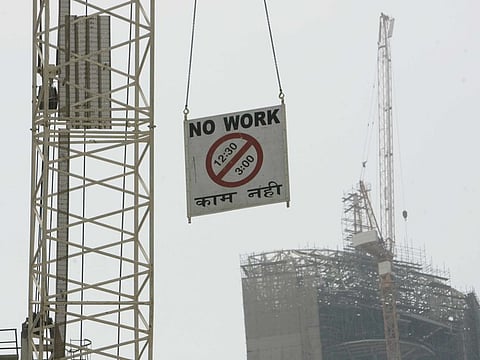Workers get midday break in summer in UAE
Break lasts from 12.30pm until 3pm from June 15 until September 15

Question
I have worked in a contracting company for two years, but during this time my company has never applied to the Ministry of Labour law to prohibit work at noon during the summer period. I would like to know from which month this decision should be applied and what is the start and end time? Can my company force us to work during this period?
Answer
According to the Ministry decision issued in 2005 concerning the prohibition of work at noon, it is enforced annually from June 15 to September 15 from 12.30pm until 3pm. You can report your company to the Ministry of Labour (also known as the Ministry of Human Resources and Emiratisation) if they make you work during this time. Companies are not allowed to breach the decision and will suffer penalties if found to be flouting the law.
Question
In case a judgement is ruled in the favour of the employee, what should be done to enforce the judgement and how long does it take for the employee to get his or her rights?
Answer
In order to enforce the judgement, an employee must approach the Execution Court and apply for the enforcement of the judgement. The Execution Court will then serve notice on the employer seeking payment within 15 days from the date of the service of the notice. It is common practice for an employer to file objections and grievances to unnecessarily delay the payment since this would only be due once those applications had been considered by the courts. As a means to secure the judgement debt the Execution Court has the power to impose certain measures. These include attachment to the company, attachment on bank accounts, shares, stocks and bonds as well as on any real or tangible assets that the employer may have in the UAE. However, all of the above measures may take months to finally conclude. The Ministry of Labour (Ministry of Human Resource and Emiratisation) has introduced added sanctions for any UAE entity failing to discharge a judgement debt within the 15 days deadline.
Ministerial Resolution No 797 of 2014 (‘the Resolution”), which has been in effect since 1 October 2014, empowers the Ministry to suspend the business license of an entity for non cooperation or payment of a judgement issued by the Labour Courts and this procedure will apply in case there is notice from the execution judge.
Moreover, the Resolution can also have a wider application by not only sanctioning the employer but also to a wider group of associated entities. Individual owners and partners of the defaulting entity may find that other entities, of which they hold a vested interest, are also subject to the Resolution’s sanction. The Ministry has announced that an employer must be given two advanced warnings of the proposed suspension, although the method or manner of communication is not clear or routinely followed. The newly-imposed sanction will remain in effect until the Execution Court has received payment of the judgement in full (inclusive of accrued interest, court fees, etc) and requested the Ministry to raise the suspension.
Increasingly more and more disgruntled employees are taking advantage of the Resolution and are quick to approach the Execution Court to seek enforcement of a judgement closely followed by an urgent application to freeze the employer’s license. The Execution Court does not hesitate to suspend the business license of a non compliant employer and we are noting that these suspensions are quickly becoming the norm and may be applied even without the requisite two advanced warnings.
In addition to the threat of an attachment order and a visit from Court Bailiffs, this new resolution highlights, to all UAE entities and employers, the importance of prompt payment of judgements within the 15 day deadline from date of notification to ensure business operations are not brought to a sudden halt.
At the same time the Article 4 of the Federal Law No. 8 of the year 1980 is very clear that you should have the priority based on the verdict.



